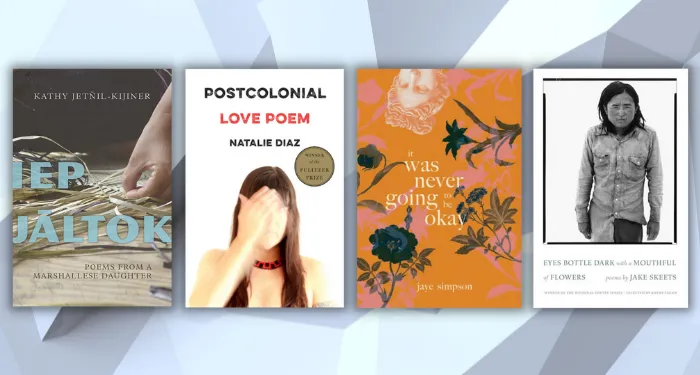
Indigenous Poets You Should Know
Editor’s note: In celebration of April as National Poetry Month, we’re looking back at this list of Indigenous poets everyone should know.
You have likely heard of Mvskoke poet, activist, and performer Joy Harjo, who is the first ever Native American U.S. Poet Laureate. Her work has been hugely influential for poets, Indigenous and otherwise. Her poems are full of emotion and strength and humor and beauty. One doesn’t get to be a country’s poet laureate on a lark, after all.
And she’s not alone. In fact, there are simply too many amazing Indigenous poets (North American or otherwise) to capture all on one list.
I could try, and it might look something like this: Wendy Rose, Emelihter Kihleng, Leanne Betasamosake Simpson, Layli Long Soldier, Qwo-Li Driskill, Heid Erdrich, Jordan Abel, Allison Hedge Coke, Alan Pelaez Lopez, Deborah Miranda, Gerald Vizenor…the list goes on. And on.
And on and on and on.
I know, I know. I have to narrow it down or we’ll be here all day (and all night, too). So the names on this list are a starting point. Some of them are poets with multiple publications and honors, while others are earlier in their careers. All of them have at least one published book, but if you’re looking for even more fresh voices you might check out Indigenous Nations Poets’ 2022 cohort of Fellows.
Wherever you start, I hope you enjoy the journey.
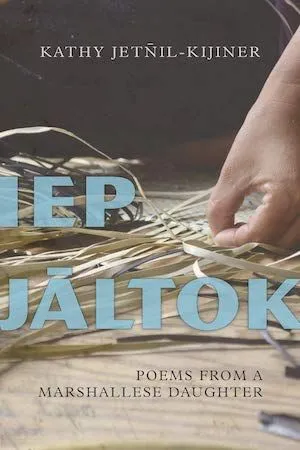
Iep Jaltok by Kathy Jetn̄il-Kijiner
Iep Jaltok takes its name from a Marshallese basket, which the epigraph explains also has gendered significance. The collection begins and ends with poems called “Basket” in which the words take the shape of a basket and bookend the collection with themes of female empowerment and family. For me, the collection was full of surprises. From one poem to the next, I followed Jetnil-Kijiner through mythology, history, pop culture, travel, and more. And through it all, I was completely captivated by her deft integration of the personal and the political so that everything flowed together organically even as the collection tackled a wide range of topics and issues.
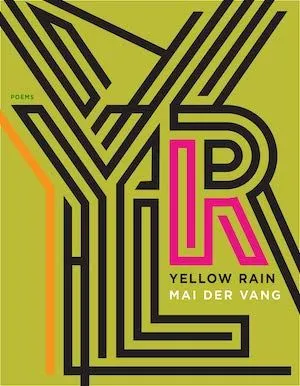
Yellow Rain by Mai Der Vang
Hmong writer Mai Der Vang has crafted a profound collection in Yellow Rain. Its name derives from a chemical biological weapon used against the Hmong in the aftermath of the U.S. war in Vietnam. The poems, collages, and typographical compositions bring together the personal, cultural, and political alongside historical documents. It’s a multivalent work that shouts over an attempted silencing. The inclusion of archival documents juxtaposed with poems like “Anthem for Taking Back” (which is every bit as amazing as its title promises) create a poetic push-and -pull that I couldn’t put down. This collection feels at once urgent and loud. It’s boldly dynamic.
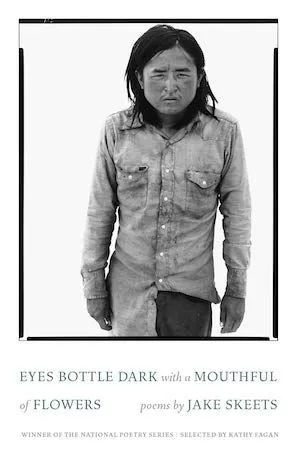
Eyes Bottle Dark With a Mouthful of Flowers by Jake Skeets
Diné poet Jake Skeets has created an intriguing and sometimes eerie imagining of the southwest. His poems are at times haunting, at others poignant, and still others simply fierce. This collection (which has won and was nominated for multiple awards) is the kind that sticks with you, whether because of one particular poem or because of the impact of all of them together. These lines from the poem “How to Become the Moon” lingered with me: “Your birthmark / will remind him of bruising, his father’s belt, broom, // branch across his face.”
![From Unincorporated Territory [Hacha] by Craig Santos Perez book cover](https://s2982.pcdn.co/wp-content/uploads/2022/03/from-unincorporated-territory-hacha-by-craig-santos-perez-book-cover-300x0.jpg.webp)
Literally anything by Craig Santos Perez
Craig Santos Perez is a CHamoru poet (and performer, activist, and scholar) whose works are, in a word, impressive. I love them for their ability to speak to a multitude of audiences at once. Sometimes his poems are funny, other times touching, and still other times serious. Oftentimes, he offers readers opportunities to support anti-colonial and environmental efforts — sometimes through hypertext, but not always…because Perez’s poems are incredibly versatile. They’re also wide ranging; for instance, his four-part collection From Unincorporated Territory (the first book of which is pictured here) explores everything from Spanish colonization to the birth of his daughter. Each book can be read on its own, or you can read them in sequence (which is quite an experience). Alternately, if you’re especially interested in issues tied to global climate change, you might give his most recent collection, Habitat Threshold, a try. Bonus: if you’re interested in literary criticism, you can check out his recently published Navigating CHamoru Poetry: Indigeneity, Aesthetics, and Decolonization.
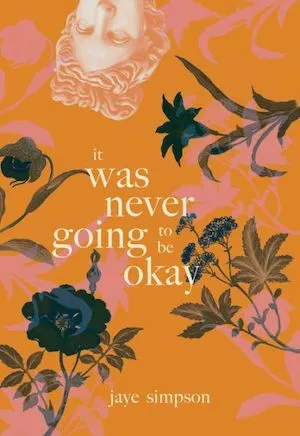
It Was Never Going to Be Okay by Jaye Simpson
The title of jaye simpson’s debut collection sets the tone for the poems inside. It’s about so many things, from queerness to Indigeneity and beyond. Some of the poems are long, sprawling across multiple pages and consisting of multiple segments. Others are short and swift, lasting just a few lines…but the ideas stay on your tongue for hours or days. It’s a hard collection to sum up in a short space, but perhaps that says something in and of itself.
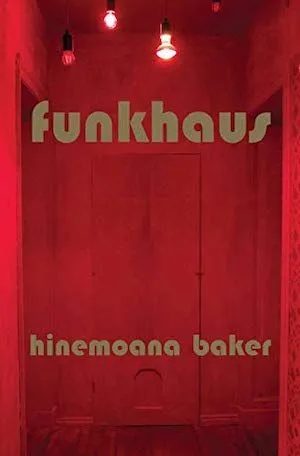
Funkhaus by Hinemoana Baker
Hinemoana Baker’s poems have always struck me as possessing that seemingly-impossible characteristic of being alternately smart, funny, and intense. Sometimes they’re all three. Often more. In this collection, for instance, the poem “The Good Ship” begins by talking about those details you sometimes learn but wish you could unlearn: “Shirley Temple’s hair wasn’t really curly. / Babies masturbate in utero.” Where does it end? Why, with the poet’s date pontificating about aliens and lizard people, of course. And then there are poems like “Aunties,” which on the surface appears to riff off of Joy Harjo’s famous poem “She Had Some Horses” but in all other ways is entirely Baker’s. It’s a poem about family and its attendant spectrum of emotions. Funkhaus is fresh and funky and absolutely incredible.
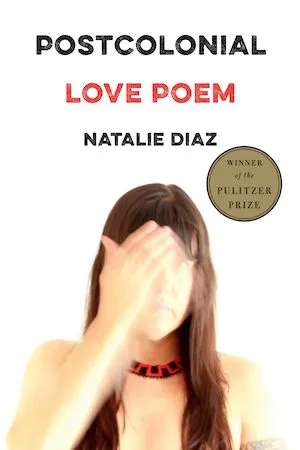
Postcolonial Love Poem by Natalie Diaz
Diaz’s first collection, When My Brother Was an Aztec, made a big impression for its powerful engagement with everything from Indigeneity to family. Her subsequent work Postcolonial Love Poem made an even bigger splash (it won the Pulitzer). It’s no wonder, either. In “Manhattan Is a Lenape Word” she asks, “Where have all / the Natives gone? / If you are where you are, then where / are those who are not here? Not here.” For me, Diaz’s poetry is full of beauty…and then there are these little moments embedded within each poem that just jump off the page. Another one is in “American Arithmetic” (the title of which already gets me) where she writes, “In Arithmetic and in America, / divisibility has rules— / divide without remainder.” Bonus: If you want to take a little poetic detour, read “Envelopes of Air,” a poetic letter exchange between Diaz and Ada Limón.
The “Teebs Tetralogy” by Tommy Pico
Pico’s poetic tetralogy — consisting of the books IRL, Nature Poem, Junk, and Feed — follows the character Teebs (Pico’s alter ego). Each book has its own distinct style. (IRL, for instance, is written as a long text message.) Nature Poem, in which Teebs can’t bring himself to write a nature poem as a Native American poet, is one of my favorites in the series. It’s wonderfully irreverent in its dismissal of settler colonial stereotypes. And, like each of Pico’s works, it’s full of humor even when it’s dealing with serious subject matter (like genocide or sexuality).
Hungry for More? Serve Yourself!
Can’t get enough Indigenous writing? Peruse this list of Native American poets or consider listening to the books on this list of recent Native American audiobooks. You might also check out this list of Indigenous memoirs or get your genre on with some works of Indigenous horror. And of course, if you’re seeking books for the littles, here are some suggestions for Indigenous authored picture books and YA books by Indigenous writers.
All Access members, continue on for 27 books out this week by BIPOC authors
What have you been reading lately? Let’s chat in the comments!
The comments section is moderated according to our community guidelines. Please check them out so we can maintain a safe and supportive community of readers!



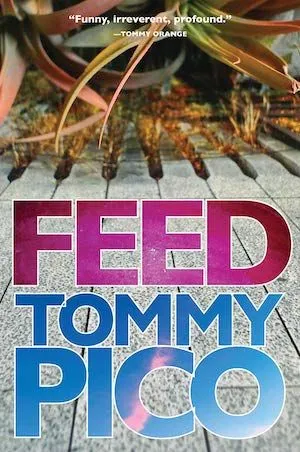






Leave a comment
Join All Access to add comments.